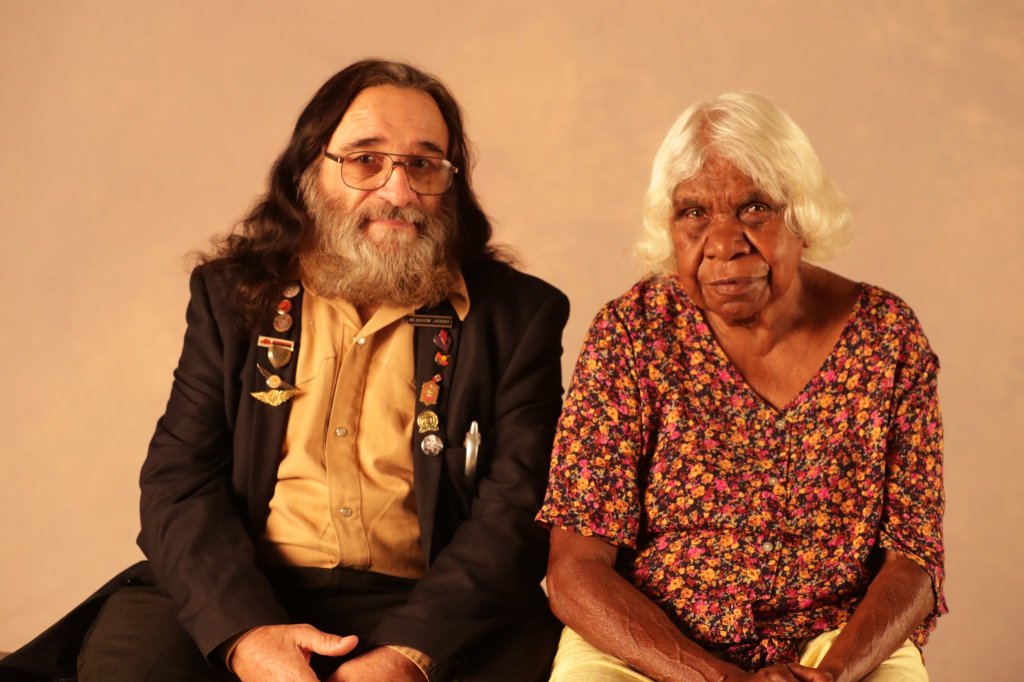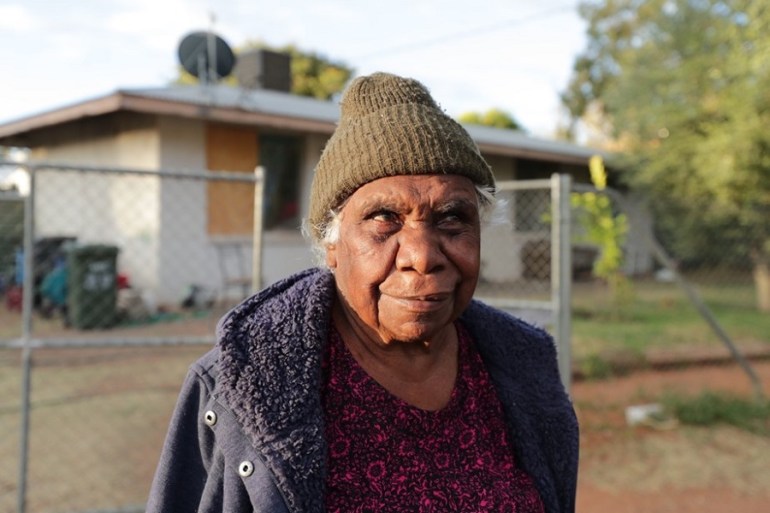Production on Penelope McDonald’s documentary Audrey Napanangka may have officially begun in 2012, but the seeds of the project were laid well before.
Filmed predominantly in Alice Springs, the story centres on the Warlpiri woman and her Sicilian partner Santo as they navigate through colonial systems to keep the children they care for together.
Having been born at a time when settler colonisation was permeating the Central Australian Desert, the subsequent changes and fusion of two worlds shifted Napanangka’s life forever. Today, she raises young people to walk in many worlds, by centering culture, language, and law in their lives alongside mainstream education.
McDonald wrote, directed, and produced the film, with her son, Dylan River as co-writer. Co-producers also include Trisha Morton-Thomas of Brindle Films and Rachel Clements.
The project was borne out of a 40-year-friendship between the director and her subject, with the pair both living in the small remote community of Lajamanu, at the top of the Tanami Desert, during the early ’80s.
They worked together on a few short local productions before Napanangka acted in Erica Glynn’s 1997 short My Bed Your Bed, produced by McDonald. She has since had numerous small roles in productions, such as in Kings in Grass Castles, Rabbit-Proof Fence, Monsters We Met, Green Bush, Samson and Delilah, Doors, Nulla Nulla, and Robbie Hood.
Her story has McDonald return to the director’s chair for the first time in three decades, having last helmed the short film Life on Earth as I Know It in 1991, prior to which she directed documentaries Too Many Captain Cooks, Travelling Warlpiris and Kamira: Pina Yanirlipa Ngurrarkurra.
As a producer, she has worked on short films, such as Tracey Moffatt’s Night Cries: A Rural Tragedy and Warwick Thornton’s Photographic Memory, as well as documentaries, including Safina Uberoi’s My Mother India, Mike Rubbo’s Much Ado About Something, and River’s 2013 directorial debut Buckskin.
A longtime resident of Alice Springs, McDonald said she was inspired to shine a light on Napanangka’s journey after “admiring the way she negotiated life”.
“Audrey is just so resilient, and she’s got a great sense of fun,” she said.
“Sometimes things were occurring in Audrey’s life that made me think, ‘Well if that happened to me, would I be able to sort of have a spring in my step and a chuckle in my voice?'”

After doing some initial filming in 2012, McDonald would return to the project sporadically across the next few years, either with her own camera or via a team of cinematographers. A total of seven shared filming duties, including River, Justine Kerrigan, Shane Mulcahy, Anna Cadden, Bonny Scott and Miriam Williams.
Further footage was captured in 2013 and 2016, before a three-week shoot in 2020, and a final block earlier this year, for which a Super 8 camera was used.
Eventually, McDonald ended up with more than 160 hours of material, with the director noting that the “writing was in the editing”.
James Bradley, Jane St Vincent Welch, and Karryn de Cinque were brought in as editors, with composer David Bridie and sound designer Liam Egan working alongside.
“It could have taken many different shapes because it’s an observational documentary. I didn’t know what was going to happen over those years we were filming, so I didn’t have a clear structure,” she said.
“[We spent] about a year in editing and working with different editors, just because of their time commitments… each of them brought great things to the project.”
Central to the film are Napanangka’s recollections of the children she loved and lost in her youth, which are told amid her battle to keep her grandchildren.
McDonald said she chose to use the Super 8 to film recreations the memories as it gave a particular feel of the past.
“Film is images. Audrey could talk about things that happened but I had to bring them to life somehow,” she said.
“There was no filming then of what was happening for Audrey, so I thought it’d be best to recreate that. Super 8 was chosen because I find it gives a particular feel of the past.”
Audrey Napanangka will screen at the Melbourne International Film Festival (MIFF) this month after having its world premiere at this year’s Sydney Film Festival. From there, the film will screen at the Darwin International Film Festival next month before being shown on NITV next year.
McDonald said she was also in talks with distributors regarding a limited cinema release and did not rule out a potential impact campaign for the film.
“One of the themes is keeping families and children safe and not moving kids,” she said.
“Another one is the importance of language, law, and culture and respecting that.
“A lot of Australian First Nations languages have been lost, so let’s as a nation value those languages and those cultures and embrace them.”
Audrey Napanangka will screen Sunday, August 14 and Tuesday, August 16 at MIFF. Find out more information here.



